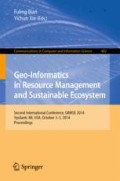Abstract
Compared wth the traditional GIS, the Gloud GIS has many advantages in infrastructure management, such as improving the utilization rate of hardware and the high performance of services, which can solve the existing problems in construction of digital city. Thus the Gloud GIS is studied and implemented. The experimental results showed that the proposed scheme outperforms the traditional GIS methods not only in efficiency but also in accuracy.
Access this chapter
Tax calculation will be finalised at checkout
Purchases are for personal use only
Preview
Unable to display preview. Download preview PDF.
References
Gallard, J., Lèbre, A., et al.: Architecture for the next generation system management tools. Future Generation Computer Systems 28, 136–146 (2012)
Mateescu, G., Gentzsch, W., Ribbens, C.J.: Hybrid Computing-Where HPC meets Grid and Cloud Computing. Future Generation Computer Systems 27, 440–453 (2011)
Vázquez, C., Huedo, E., et al.: On the use of Clouds for Grid resource provision. Future Generation Computer Systems 27, 600–605 (2011)
Buyy, R., Ranjan, R.: Special section: Federated resource management in Grid and Cloud computing systems. Future Generation Computer Systems 26, 1189–1191 (2010)
Murphy, M.A., Goasguen, S.: Virtual Organization Clusters: Self-provisioned Clouds on the Grid. Future Generation Computer Systems 26, 1271–1281 (2010)
Dou, W., Qi, L., et al.: An evaluation method of outsourcing services for developing an elastic Cloud platform. Supercomput (2010)
Jha, S., Merzky, A., Fox, G.: Using Clouds to provide Grids with higher levels of abstraction and explicit support for usage modes
Michael A Murphy. Linton Abraham, Michael Fenn Sebastien Goasguen. Autonomic Cloud on the Grid [J]. Spriner Science+Business Media B.V, (2009)
Peng Liu. Cloud Computing [M].Beijing: Publishing House of Electronics Industry[M].(2011)(chinese)
Geoffrey Fox. Geoinformatics and Data Intensive Applications on Clouds. State Key Laboratory of Information Engineering in Surveying Mapping and Remote Sensing, Wuhan University. (2011)
Zhi Zeng, Jin Wang etc. A mechanism provisioning on computational resource and services with high effectively under Gloud environment [J]. Journal of Zhejiang University(Science Edition), (41):353-357 (2014) (chinese)
ArcGIS Cloud. http://www.esrichina.com.cn/softwareproduct/technology/ArcGIS_Cloud/
Author information
Authors and Affiliations
Editor information
Editors and Affiliations
Rights and permissions
Copyright information
© 2015 Springer-Verlag Berlin Heidelberg
About this paper
Cite this paper
Shi, Y., Bian, F. (2015). The Design and Application of the Gloud GIS. In: Bian, F., Xie, Y. (eds) Geo-Informatics in Resource Management and Sustainable Ecosystem. GRMSE 2014. Communications in Computer and Information Science, vol 482. Springer, Berlin, Heidelberg. https://doi.org/10.1007/978-3-662-45737-5_6
Download citation
DOI: https://doi.org/10.1007/978-3-662-45737-5_6
Publisher Name: Springer, Berlin, Heidelberg
Print ISBN: 978-3-662-45736-8
Online ISBN: 978-3-662-45737-5
eBook Packages: Computer ScienceComputer Science (R0)

